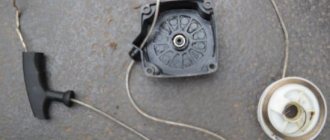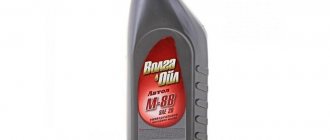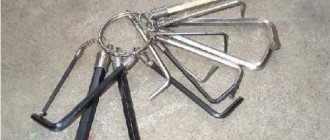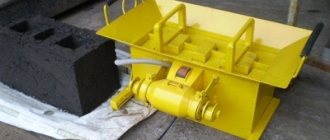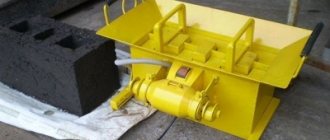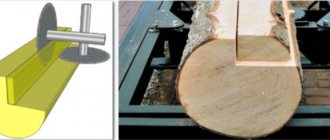Litol is the collective name for multi-purpose plastic and waterproof lubricants. The most common representative of this series is considered to be Litol-24, which is used in almost all branches of mechanical engineering.
The first work in creating a universal lubricant was carried out in the USSR and the first prototypes appeared in 1933 . The first manufacturer of lithol was CIATIM , an institute specializing in the creation of low-temperature lubricants and aviation oils.
Initially, the lubricant was used only in the defense and military industries, but from about the mid-70s of the last century, the lubricant began to appear on the public market. For almost 50 years, Litol-24 has been the most widely used composition in Russia and the CIS .
What is Litol?
Litol is the most famous universal grease based on a lithium thickener in Russia and the CIS countries.
Appearance and color
Lithium soap lubricants come in different colors. This parameter depends on the additives and dyes introduced by the manufacturer. Car owners mention white and burgundy (cherry), blue and green Litol. However, according to the standard, the spectrum of its shades is amber: it starts with light yellow and ends with brown.
An uncharacteristic color should alert you: either this is not Litol, or its composition does not meet the standards.
In the USSR, the lubricant was transparent. Changing and adding components affects this characteristic - the material becomes cloudy. The transparency of modern Litol may vary between different manufacturers, but does not affect the properties of the product.
Consistency
Lubricants of the lithol family are homogeneous and dense.
Consistency according to ISO 2137 – semi-solid.
The contents of the package resemble a thick ointment and look like Vaseline or boiled condensed milk. The original Litol's viscosity characteristics tend to be NLGI class 3.
Lubricant composition
- Litol is based on a mixture of mineral oils with a viscosity value of 60-75 mm2/s (at 50°C).
- the base is thickened with lithium hydroxide with hydroxystearic acid or its glyceride. The average thickener share is 10-13%.
- The classic composition also includes the antioxidant diphenylamine (0.5%) or neozone-D (0.7%) and a viscosity additive - polyisobutylene P-20 (4%).
Standards and GOSTs
The manufacturing technology, composition and properties of lithium lubricants are regulated by state standards or technical specifications: for example, Litol 24 - GOST 21150-87 (reissued as GOST 21150-2017 ). The same standard describes the modification of Litol-24RK, intended for the preservation of friction units.
Specifications
- NLGI – 3;
- DIN 51 502 – K3K-40.
Tolerances
- MVK Gosstandart of the Russian Federation No. 814/422;
- OEM approval FIAT-VAZ 55588.
Basic properties
The lubricant does not contain water and exhibits excellent moisture-resistant and anti-corrosion properties.
Lithol is characterized by increased resistance to shear, chemical attack and temperature changes. It is a dielectric.
Performance characteristics are maintained at temperatures from -40°C to +120°C, and for a short time at +130°C. At frosts of -30°C and below, Litol can thicken, but heating the units treated with it during operation restores its properties. The density of the material remains unchanged when heated.
The material is flammable! Flashes in a closed crucible at 183°C, in an open crucible – at 199°C. Temperature limits of ignition from 250°C to 364°C.
Lubricant specifications
The basic parameters of Litol according to GOST are presented in the table.
| Name | Meaning |
| Colloidal stability (% oil released), max | 12% |
| Volatility (t 120°C), max | 6% |
| Dropping temperature, min | 185°C |
| Density (at 15°C) | 892 g/cm3 |
| Penetration number (t 25°C) | 220-260 |
| Dynamic viscosity (t-20/0/50°С at an average strain rate gradient of 10/10/100 s-1) | 650/280/8 Pa s |
| Tensile strength (t 20/80°С) | 500-1000/>200 Pa |
| Mass fraction of free alkali in terms of NaOH, max | 0,1% |
| Mass fraction of mechanical impurities, max | 0,05% |
| Welding load Рс, N(kgf) | 1410 (141) |
| Critical load Pk, N(kgf) | 630 (63) |
| Bully index | 28 |
| Change in rubber volume/hardness (grade 26-44),% | ±8 |
Parameter values for different manufacturers' products may vary.
VNII NP-242
A homogeneous soft ointment of black color [with the addition of 2% molybdenum disulfide MoS2], manufactured in accordance with GOST 20421-75, its properties are close to multi-purpose lubricant. VNII NP-242 grease is water-resistant, has low volatility, good anti-wear properties and poor mechanical stability. It is mainly used in bearings of horizontal marine electrical machines. The service life at a temperature of 60...80°C and a rotation speed of 1500-3000 min-1 reaches 10,000-24,000 hours.
Characteristics of VNII NP-242 GOST 20421-75
Dropping point
≥ 170 oC Tensile strength [Pa]
500…1200 Pa at 20oC
250 … 650 Pa at 50oC
≥100 Pa at 80oC
Viscosity [Pa•s]
800 … 1600 Pa•s at -20oC
200 … 400 Pa•s at 0oC
140 … 240 Pa•s at 20oC
Mechanical stability [Pa]
initial tensile strength 1000...2000 Pa at 20oC Volatility [%]
oC Water washability [%]
3.5% in 6 hours at 40oC Extreme pressure load properties [N]
seizing 700 N
welding 2250 N
Temperature range of application [oC]
-30oC
100oC
Classification of Lithols
The lithol family is represented by several popular brands CIATIM and Litol 24. All lubricants are three-component (base, thickener, filler), multi-purpose.
CIATIM-201
The simplest frost-resistant lubricant based on mineral oil with lithium stearate and an antioxidant additive. Developed for widespread use. Standard GOST 6267-74.
CIATIM-202
All-season lubricant based on transformer and aviation oil with lithium soap of higher fatty acids and antioxidant. Similar in composition to Tsiatim-201. In most cases, these lubricants are interchangeable. Standard GOST 11110-75.
CIATIM-203
Frost-resistant lubricant based on transformer or spindle oil with lithium soap, extreme pressure and viscosity additives. It is superior in quality to those mentioned. Standard GOST 8773-73.
Litol-24
All-season universal lubricant based on mineral oils with a possible admixture of synthetics, thickened with lithium soap, with a viscosity additive and an antioxidant. Can replace all of the above. Standard GOST 21150-87 (21150-2017).
What is their difference
Despite the similar composition of lithol lubricants, their varieties have significant differences in performance characteristics:
| Brand | Temperature range | Mechanical stability | Colloidal stability | Tensile strength | Other Features |
| CIATIM-201 | from -60°С to +90°С | Low | Low | Short | Frost resistance, hygroscopicity, incompatibility with plastics and rubber |
| CIATIM-202 | from -50°С to +120°С | Low | Average | Short | Frost resistance, water resistance, hygroscopicity |
| CIATIM-203 | from -50°С to +90°С | Average | High | Short | Frost resistance, hygroscopicity, water resistance, extreme pressure properties |
| LITOL-24 | from -40°С to +120°С | High | High | High | Heat stability, hygroscopicity, water resistance, anti-friction and anti-corrosion properties |
CIATIM brand products are designed for harsh weather conditions or winter use. Only CIATIM-202 lubricant can be called all-season, but in terms of mechanical and colloidal stability it is significantly inferior to LITOL 24.
Product Features
In order for the car to serve for a long time and not cause any problems, individual parts require regular lubrication. It is for this reason that you should definitely familiarize yourself with all the technical characteristics of Litol 24. The lubricant release regulations are described in GOST 21150 87. It is universal and is used in many fields of activity. Litol is water resistant and has an anti-friction effect. It is usually used to process components where it is necessary to prevent friction.
Litol 24 is used not only for vehicles. Often the lubricant is used for industrial purposes and ship installations. It has been proven that it retains its high technical characteristics at temperatures from -40 to +120 degrees. Litol 24 is produced by thickening. The composition includes mineral oil, lithium soap, as well as a number of additional additives that protect against oxidation.
When choosing Litol 24, pay attention to the color of the lubricant. A quality product has a yellow or light brown tint
We strongly recommend that you avoid purchasing lubricants that are red, blue, green or other colors.
Lubricants for grinder gearboxes
Scope of application Litol-24
The main purpose of Litol is to lubricate surfaces and friction units with low and medium loads, as well as with increased loads at low speeds: pulling cables, hinges, bearings, shafts, axles, splined joints, hubs, calipers, hinges.
Features of application
There are several important limitations in operating the product:
- Cannot be used to lubricate CV joints.
- Do not mix with silicone lubricants and calcium thickener formulations.
There is a widespread belief that Litol is incompatible with aluminum and its alloys, especially in a humid environment. There are no official warnings about this, and domestic experiments do not confirm the destructive effects.
Where is Litol used?
Litol is widely used in the maintenance of cars and trucks, tracked vehicles, specialized agricultural, road and other transport equipment. Parts to be processed with this fuel and lubricant:
- sliding bearings of different types;
- closed and open rolling bearings of the chassis, transmission, suspension and attachments (hubs, supports, steering knuckles, axle shafts, gear and other transmissions, rear-wheel drive universal joints, couplings, pumps, generators, etc.);
- threaded and swivel connections;
- guides (window lifters, sunroof, etc.);
- lightly loaded actuators;
- cables, rods, etc.;
- electrical blocks and connectors, battery terminals;
- door and lid hinges.
Where else can it be used?
In addition to the automotive industry, Litol 24 is used in the repair and maintenance of railway and air transport, ships, industrial special equipment, industrial machines and mechanisms, and electrical equipment. On thematic forums there are references to the use of lubricant for household needs (lubricant for door and furniture hinges, power tools).
What is the consumption of Litol?
According to the manual of the Ministry of Transport of Russia, the standard consumption of grease for passenger cars is 0.1 kg for every 100 liters of fuel.
Until the early 90s, more detailed recommendations for domestic cars were indicated in chemotological maps. For example, 65 g of Litol is placed in the front wheel bearing of a VAZ-2105, 15 g in the steering rod joints, etc. Nowadays, manufacturing plants are not required to draw up such maps, and often there is no information on fuel consumption.
A car that comes off the assembly line runs on factory lubricants for up to 30-40 thousand km; for further operation it is recommended to replace them completely or replenish the used volume.
How much Litol to put in the bearings can be calculated independently using the formula:
V = D * B * 0.5
where V is the volume of lubricant (ml), D and B are the outer diameter and height (width) of the bearing (cm), respectively.
Or roughly calculate using the table:
| Marking | Speed value (by bearing type) | Lubricant filling volume | ||
| Ball | Needle, spherical, conical roller, radial | Roller | ||
| VL (very low) | < 30 000 | < 30 000 | 90% | |
| L (low) | < 100 000 | < 75 000 | < 75 000 | 75% |
| M (medium) | < 300 000 | < 210 000 | < 270 000 | 50% |
| H (high) | < 500 000 | ≥ 210 000 | ≥ 270 000 | 30% |
| VH (very high) | < 700 000 | 20% | ||
| EN (extreme high) | ≥ 700 000 | 15% | ||
In general, car owners and mechanics on forums and review sites note the economical consumption of Litol 24 lubricant.
ACCEPTANCE
2.1.
The lubricant is taken in batches. A batch is considered to be any quantity of lubricant produced in one technological cycle, homogeneous in quality indicators and component composition, accompanied by one quality document. The document certifying the quality of a lubricant of the highest quality category must contain an image of the state Quality Mark.
2.2. The sample size is in accordance with GOST 2517.
2.3. To verify compliance of lubricant quality with the requirements of this standard, lubricants are subjected to acceptance and periodic tests.
2.3.1. Each batch of lubricants is subjected to acceptance tests according to indicators 1, 2, 4 – 12 of the table.
2.3.2. The manufacturer carries out periodic tests of the lubricant according to indicators 13 - 15 of the table for Litol-24 lubricant - at least once every 6 months, for Litol-24RK lubricant - at least once a quarter.
If the results of periodic tests are unsatisfactory for at least one indicator, each batch of lubricant is checked until positive test results are obtained for at least three batches in a row.
2.3.3. Indicator 3 of the table is determined when supplying Litol-24 lubricant for export and at the request of the consumer.
2.4. If unsatisfactory test results are obtained for at least one indicator, repeat tests are carried out on a newly selected sample from the same sampling locations.
The results of repeated tests apply to the entire batch.
2.5. To check the compliance of packaging and labeling with the requirements of this standard, 3% of packaging units, but not less than three, are selected. If unsatisfactory results are obtained, a double sample is checked.
The results of the re-inspection apply to the entire batch.
Advantages and disadvantages
Disputes about the qualities of Litol and the possibility of its use in modern cars are built around the advantages and disadvantages of lubricants made according to the recipe of the last century.
pros
Among the advantages of Litol-24 lubricant are technical characteristics:
- excellent adhesion;
- stability in the most important parameters;
- heat and water resistance;
- zero electrical conductivity.
The low cost and long shelf life were also praised by car owners.
Minuses
- flammability;
- low resistance to welding loads;
- poor heat dissipation;
- absence of anti-wear additives (according to GOST).
Also, the stickiness of the thick composition is justifiably considered a negative factor, due to which dust, including abrasive, accumulates in it.
Separately, it is worth mentioning that the production of Litol 24 today is not necessarily regulated by state standards. Many manufacturers do not comply with GOST, replacing it with TU. This causes conflicting responses.
On the one hand, lubrication can be improved with the help of additives: this is how Litol-24M is produced with a friction modifier (TU 0254-015-00148820-99). On the other hand, the buyer risks purchasing a low-quality product from unknown raw materials.
Diet
We have already said that solid oil helps get rid of psoriasis quite quickly. But the effect will be much better if you follow a certain diet. If you consult a doctor about this problem, he can prescribe medication and some painless procedures.
Let's pay a little attention to proper nutrition. For psoriasis you should eat:
- vegetables;
- fruits;
- berries;
- greenery;
- dairy products;
- eggs;
- poultry meat;
- fish;
- beef;
- cereals;
- vegetable oils.
Do not use:
- citrus;
- potatoes;
- eggplant;
- tomatoes;
- Bell pepper;
- alcoholic drinks;
- chocolate;
- coffee.
It is also worth saying that you should not smoke. If a person smokes, then it is worth reducing the number of cigarettes smoked per day to a minimum. Follow the rules of the diet, use grease-based ointments, then you will be able to get rid of psoriasis quickly.
Why is Litol-24 lubricant popular among drivers?
Despite the contradictions, Litol-24 is one of the most famous and popular universal greases of domestic production. Its long history has made it recognizable. The habit of using this particular lubricant, and often its reserves, was passed on from the older generation to the younger.
Litol is in constant demand among drivers as a reliable, cheap and easy-to-use product. It is put into mechanisms according to the “put it and forget it” principle; its performance properties allow it to solve most daily problems, and when the car is idle, the composition protects friction units from corrosion.
Release forms and articles
Most manufacturers have an article number for each release form of Litol-24, but some brands do not use or do not publish special designations. Sellers can also assign their own codes - in this case, the store catalog number and the manufacturer’s number will not match.
They produce lubricant in small and large packaging: tubes from 100 g, plastic and cardboard tubes of 400 g, polymer and metal buckets and cans from 800 g to 10 kg, steel drums, cans and barrels from 17.5 to 180 kg.
Litol-24 marking (article and weight) from some manufacturers:
| Manufacturer | vendor code | Weight | Tara |
| Gazpromneft | 2389906978 | 100 g | Tube |
| 2389907079 | 150 g | Doypack | |
| 2389901373 | Tube | ||
| 2389907073 | 300 g | Doypack | |
| 2389901374 | 350 g | Tube | |
| 2389906872 | 400 g | Cartridge (tube) | |
| 2389906898 | 4 kg | Metal bucket | |
| 2389906897 | 8 kg | Metal bucket | |
| 2389904078 | 18 kg | Metal bucket | |
| 2389901377 | 45 kg | Barrel polymer | |
| 2389901378 | 170 kg | Metal barrel | |
| Lukoil | 1469696 | 5.6 l | Plastic bucket |
| 1470311 | 10.7 l | Plastic bucket | |
| 1500183 | 20 l | Polymer canister | |
| 1648260 | 210 l | Metal barrel | |
| NZSM | 1831 | 400 g | Cartridge (tube) |
| 751 | 4 kg | Plastic bucket | |
| 752 | 9 kg | Plastic bucket | |
| 542 | 18 kg | Drum steel | |
| LuxeOil | 314-411 | 100 g | Tube |
| 321-888 | 160 g | Tube | |
| 314-506 | 250 g | Tube | |
| 320-053 | 360 g | Tube | |
| 315-676 | 400 g | Cartridge (tube) | |
| 315-737 | Metal can | ||
| 315-736 | 800 g | Metal can | |
| 186-004 | 850 g | Polymer jar | |
| 186-002 | 2 kg | Polymer jar | |
| 316-267 | 9.5 kg | Barrel polymer | |
| 315-735 | 17.5 kg | Metal bucket | |
| 186-009 | 21 kg | Metal can | |
| 186-008 | 37 kg | Barrel polymer | |
| OILRIGHT | 313-794 | 100 g | Tube |
| 320-358 | 160 g | Tube | |
| 187-011 | 800 g | Plastic jar | |
| 187-012 | 2 kg | Plastic jar | |
| 187-031 | 5 kg | Plastic jar | |
| 187-032 | 9.5 kg | Metal can | |
| 320-123 | 21 kg | Barrel polymer | |
| Sintec | 663322 | 250 g | Tube |
| 800401 | 800 g | Metal can | |
| 81827 | 2.5 kg | Plastic jar | |
| 99000 | 9.5 kg | Plastic bucket | |
| 90053 | 18 kg | Plastic bucket |
Storage periods and methods
The shelf life of Litol-24 is one of its strengths. The guaranteed shelf life is 5 years, but is virtually unlimited under appropriate conditions.
The room where the lubricant is stored must be cool and dry, well ventilated, away from sources of open flame and protected from precipitation. It is preferable to leave fuels and lubricants in the original container, but if necessary, they can be transferred to a glass or polymer container with a tight lid.
Litol-24 should not be kept near acids, compressed and liquefied gases, including oxygen and other oxidants, as well as explosive and flammable substances.
Temperature conditions from -40˚С to +40˚С are suitable for transportation.
Precautionary measures
Litol-24 belongs to class 4 according to GOST 12.1.007 - it is low-hazard and does not emit toxic substances. Moreover, the composition is flammable. When working with it, you must comply with a number of safety requirements and precautions:
- In working and storage areas, ensure good ventilation (supply and exhaust), avoid handling open flames, smoking, and ground equipment.
- Prevent lubricant from entering the domestic sewer system, storm drains, or open water bodies.
- When working with the product, use PPE (mask, gloves) and follow the rules of hygiene: wash your hands with soap and water after contact with the lubricant; in case of contact with the mucous membrane (including the eyes), wash with warm water and soap.
- In case of fire, extinguish with foam based on PO-1D, PO-ZA, sprayed with water.
List of reliable manufacturers
Given the increased and steadily growing demand, Litol-24 is produced by dozens of companies. When choosing a proven and reliable manufacturer, we recommend that you first pay attention to the products of the following brands:
- LLC "NovoVital" The company specializes in the development and production of multi-purpose and moisture-resistant lubricants. The company is located in Zelenograd and has been operating since 2007.
- "Yaroslavl lubricants". The company has been operating since 2004 and is considered one of the largest suppliers in the central region. All manufactured products undergo strict laboratory control and comply with GOST requirements.
- CenterNefteSbyt. This is the official dealer of the largest oil and gas company, supplying the domestic market with high-quality products that are not inferior in basic characteristics to lubricants from the world's leading manufacturers.
- "Petroleum product". A subsidiary of the Rosneft concern, operating since 1968. The company produces a wide range of lubricants that are used in all industries.
Let us note that this is not a complete list of domestic manufacturers, but the best companies according to experts have been selected here.
Source
All modern industrial and transport equipment, and especially bearings, operate under high loads. To maintain the operational properties of all mechanisms, high-quality lubricant is required. Litol-24 fulfills its mission with dignity.
Everyone is familiar with the expression: “If you don’t apply it, you won’t go.” But it is now used to characterize a sphere completely removed from mechanics. Although, first of all, this phrase directly refers to mechanical components and assemblies. After all, without good lubrication, it is impossible to imagine the high-quality operation of mechanisms and components operating under conditions of severe friction. And here Litol finds application. Because it has all the necessary characteristics:
- Resistant to aggressive environments. It is expressed by colloidal stability, which for Litol does not exceed 12%. This means that the lubricant will retain its consumer properties under severe operating conditions;
- Water resistance. Litol perfectly prevents water from entering critical interfaces even at high temperatures. After all, the dropping temperature characteristic of Litol is not lower than 185 degrees;
- High tensile strength at temperatures up to 20 degrees it reaches 1000 Pa, and when increased to 80 degrees it decreases to 200 Pa;
- Good consistency and resistance to evaporation. At a temperature of 120 degrees, Litol evaporates by no more than 6% in an hour;
- Withstands high welding loads, more than 1981 N and critical loads of at least 617 N;
- It has sufficient fluidity at a cold temperature of -20, this figure reaches 6500 P. At high temperatures reaching 80 degrees, the fluidity of the material decreases to 80 P.
Analogues and competitors
In terms of technical characteristics and application, Litol-24 has a number of analogues and competitors that position themselves as more acceptable or qualitatively superior. Among them, we can consider fuels and lubricants of domestic and foreign production.
| Name | Description | |
| Russian | ||
| Solid oil | Consistency class according to NLGI: 2. Based on calcium soap. Temperature range from -30°С to +65°С. Corrodes rubber and plastics | |
| Fiol-1 | NLGI consistency class: 1. Grease with lithium soap and additives. Less viscous, less stable, more frost-resistant than Litol-24. Temperature range from -40°С to +120°С | |
| Fiol-2 | NLGI consistency class: 2. Mineral base with lithium soap. Operable from -40°C to +100°C. Less thick, less stable than Litol | |
| Fiol-3 | NLGI consistency class: 3. Mineral base with lithium soap. Most similar to Litol-24, mixes with it | |
| Imported | ||
| Castrol | LM, LMX | Consistency class according to NLGI: 2. Temperature range from -35°C to +140°C (LM) and up to 170°C (LMX). Pressure resistance, anti-corrosion and extreme pressure properties |
| Mobile | MOBILUX EP2, EP3 | Consistency class according to NLGI: 2, 3. Composition performance from -20°C to +130°C. Resistance to shock loads and vibration, anti-corrosion properties, extreme pressure properties (EP additives) |
| Shell | Alvania RL (Gadus S2 V100) 2, 3 | Consistency class according to NLGI: 2, 3. Temperature range from -20°C to +130°C. Vibration resistance, anti-scuff properties, incompatible with rubber parts |
| Alvania EP(LF) , Retinax EP (Gadus S2 V220) 2, 3 | ||
| ESSO | BEACON 3 | Consistency class according to NLGI: 3. Operation at temperatures from -30°C to +140°C. Vibration resistance |
| Texaco | HYTEX EP-2 | NLGI consistency class: 2.5 (2/3). Temperature range from -20°C to +130°C. Extreme pressure properties |
Despite the improved anti-wear characteristics, many of the proposed substitutes are inferior to Litol-24 in terms of thermal stability.
Aerosol lithium greases
Plastic lubricants in aerosol form deserve special attention. Spray lubricants with lithium are produced by foreign and domestic brands: MANNOL, Xado, RUNWAY, Hi-Gear, Texon, ABRO, Fenom, KERRY, ASTROhim, Arsenal, etc. Due to their high penetrating ability, many of them are intended mainly for processing threaded connections, cables and guides, but some are also suitable for loaded components.
WD-40 SPECIALIST
White lithium grease from the well-known manufacturer WD-40 is one of the best aerosol fuels and lubricants. It is used to reduce friction in mechanisms operating under excessive load in the range from -18°C to +140°C. Protects against corrosion.
FAQ
What color should Litol 24 lubricant be?
Litol 24 has the appearance of a homogeneous ointment from yellow to light brown. A good lubricant will be thick, without lumps and with a very oily texture.
What can be lubricated with Litol 24 lubricant?
Lithol is used to lubricate steering ball joints and threaded connections to impart anti-corrosion properties, but this lithium grease is most in demand when servicing rolling and sliding bearings of all types, as well as gears.

